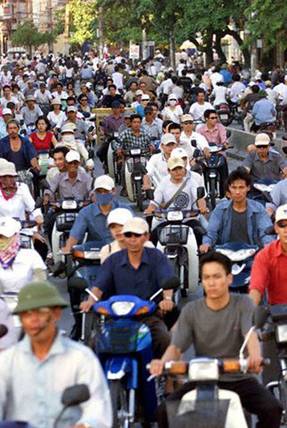
| VND2 trillion to reduce capital traffic jams by 2015 | |
Hanoi will spend nearly VND2 trillion (USD96 million) to clear traffic jams at 27 places, reduce 40% of the hours lost to congestion and limit new congestion spots during the 2012-2015 period. To clear the traffic jams, Hanoi has simultaneously carried out seven solutions such as dividing lanes, reshuffling parking lots, upgrading the infrastructure by setting up new overpasses and introducing new traffic lights. The traffic congestion points have been reduced from 134 to 89. The local Department of Transport has proposed to clear another 27 traffic congestion points and reduce the hours lost to traffic congestion by 40% by 2015. In reality, Hanoi’s traffic problems are quite complicated and mostly occur on Ring Road No. 3 and the routes into the city’s centre. The main reason for the problem is weak infrastructure. The land for traffic infrastructure inside Hanoi is only 7-8% of city’s area, while the total land for traffic in the approved urban plan is 20-26%. Low awareness among drivers is another reason for the chaos. Hanoi People’s Committee said it would prioritise key traffic projects such as Ring Road 1, 2 and 3. The constructions on arterial roads such as Van Cao-Ho Tay, Cat Linh-La Thanh-Thai Ha-Lang would also be quickened. Hanoi will also build eight new overpasses at key junctions. More parking lots and multi-story car parks will be built inside the city in order to meet demand. Meanwhile, bus stations will be relocated from the city centre to ease passenger buses from other provinces adding to the city’s traffic. To deal with the public transportation, Hanoi will quicken construction of the bus rapid transit (BRT) line from Kim Ma Station to Yen Nghia Station to be completed in 2013. Rail route No. 3 from Nhon to Hanoi Station has been scheduled to opened in 2016, while rail routes No. 2A from Cat Linh to Ha Dong and No. 2 from Nam Thang Long to Tran Hung Dao will also be sped up. The total investment is estimated at VND1,944 billion with VND1.5 trillion for basic construction and VND386 billion for management. VND20 billion will also be used for promotion activities to raise people’s awareness of traffic laws. | |
| Dantri |
